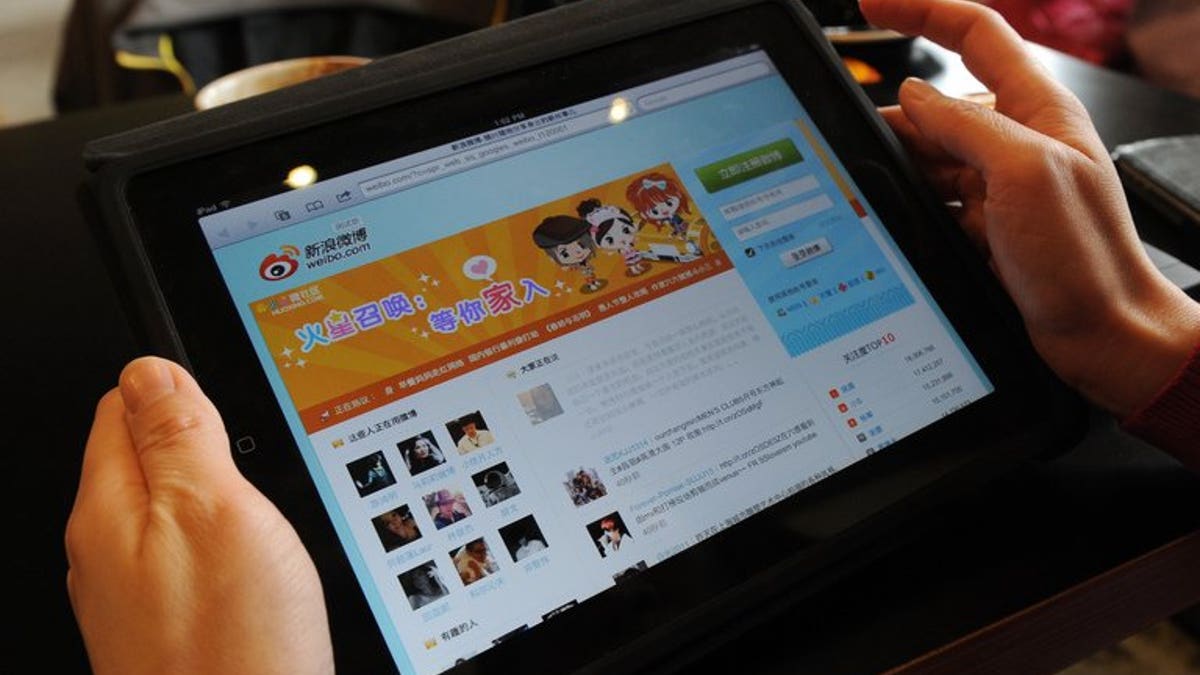
A woman views the Chinese social media website Weibo at a cafe in Beijing on April 2, 2012. The drama of China's Bo Xilai trial has millions glued to their screens as a court posts Twitter-like updates in what state media say is an unprecedented advance for transparency in the communist-ruled country. (AFP/File)
BEIJING (AFP) – The drama of China's Bo Xilai trial has millions glued to their screens as a court posts Twitter-like updates in what state media say is an unprecedented advance for transparency in the communist-ruled country.
But while the Jinan Intermediate People's Court is posting details of the proceedings on Sina Weibo, a Chinese equivalent of Twitter, they are sometimes delayed and no independent observers are in court.
Transcripts, video and audio clips showed Bo -- formerly a high-flying politician who was tipped for a top job in Beijing -- colourfully denying bribery accusations, labelling his wife "insane" and comparing another witness to a "mad dog".
The court's verified weibo account was set up less than a week ago but has already accumulated more than 400,000 followers as people across China flocked online for updates.
In a mark of how social media has dominated coverage of the trial, a television anchorwoman was seen staring at her phone for updates as she broadcast live.
"When the court's weibo is the only source of news on the trial is it wrong to use a phone?" the presenter, Yang Shu, asked on her own weibo account after meeting with online ridicule.
"Isn't bowing your head to read the latest news better than raising your head with nothing to say? This is the new-media age."
Only select members of state-run media were allowed into the court, leaving dozens of reporters to strain at a screen carrying the online updates in a court-run media centre in Jinan, in eastern China.
Even so the state-run China Daily said the case "breaks ground for transparency" in a front-page headline Friday.
For China's Communist Party, which faces much resentment over the lavish lifestyles of high officials as exposed by the Bo affair, microblogging allowed a "controlled openness", according to Zhan Jiang, professor of journalism at Beijing's Foreign Studies University.
"I call it a kind of openness which is also controlled, because it's not like a live broadcast... only approved content is put online," he told AFP. "I think this is a clever tactic by officials.
"This is the first time social media has been used to broadcast such important political news... for Chinese people this is extremely fresh."
When the "Gang of Four" -- a faction that included the widow of founding communist leader Mao Zedong -- were put on trial in 1980, recorded highlights were shown on state television.
The Bo trial proceedings -- embracing villas in France, hot-air balloons and a Segway scooter -- have captivated their audience, but steered clear of more general criticism of the party.
"The content of the defence has been limited to disputes over bribery accusations -- it doesn't extend to more politically sensitive topics," Zhan said.
Users attempting to comment on the court's weibo account are met with a message saying that their post will take some time to emerge -- giving authorities an opportunity to censor outspoken posts.
One user mocked a bribery charge, posting "1 million? He's such a bigwig, that kind of money is not even enough to pay his driver". The comment was deleted within minutes.
Nonetheless the trial -- including its coverage -- was the number one topic of discussion on weibos Friday.
"Frankly, it's unprecedented in China's legal history to publish the court record," said one user.
"For this trial -- apart from the verdict, which I don't think will be the court's decision -- we should give the court some praise for its procedure. Well done!"
But another countered: "Weibo update is not live video. Records can be changed."
